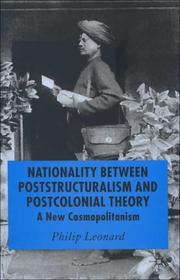| Listing 1 - 10 of 357 | << page >> |
Sort by
|
Book
Abstract | Keywords | Export | Availability | Bookmark
 Loading...
Loading...Choose an application
- Reference Manager
- EndNote
- RefWorks (Direct export to RefWorks)
Book
Year: 2001 Publisher: Bloomington (Ind.): Indiana university press,
Abstract | Keywords | Export | Availability | Bookmark
 Loading...
Loading...Choose an application
- Reference Manager
- EndNote
- RefWorks (Direct export to RefWorks)
Book
Year: 2003 Publisher: Durham (N.C.): Duke university press,
Abstract | Keywords | Export | Availability | Bookmark
 Loading...
Loading...Choose an application
- Reference Manager
- EndNote
- RefWorks (Direct export to RefWorks)
Book
ISBN: 3631332424 Year: 1998 Publisher: Frankfurt am Main : Lang,
Abstract | Keywords | Export | Availability | Bookmark
 Loading...
Loading...Choose an application
- Reference Manager
- EndNote
- RefWorks (Direct export to RefWorks)
Book
Year: 1968 Publisher: The Hague Paris Mouton
Abstract | Keywords | Export | Availability | Bookmark
 Loading...
Loading...Choose an application
- Reference Manager
- EndNote
- RefWorks (Direct export to RefWorks)
Book
ISBN: 9004651985 Year: 2023 Publisher: Leiden : Brill Academic Publishers,
Abstract | Keywords | Export | Availability | Bookmark
 Loading...
Loading...Choose an application
- Reference Manager
- EndNote
- RefWorks (Direct export to RefWorks)
Faced with the demise of their country on the world stage, with the Americanization of their society and with the prospect of integration into Europe, many people in postwar-Britain, and in particular in England, began to look more closely at their national identity. Using literature as a source material, this study investigates postwar images of Englishness as they are defined in relation not only to 'Americans' and 'Europeans', but also to other foreigners: the 'Arabs' and the 'Russians.' In the context of the Anglo-American novel particular regard is given to Englishness in Evelyn Waugh's The Loved One and David Lodge's Changing Places. Subsequently the book focuses on that peculiarly English genre 'the invasion story', tales in which Englishness comes under direct attack from evil plotters from abroad. While the history of the genre is discussed at some length, detailed attention is paid to images of Englishness in Angus Wilson's The Old Men at the Zoo (united European forces invade a Euro-recalcitrant Britain), Anthony Burgess' 1985 (Arab infiltrators prepare to Islamize the English) and Kingsley Amis' Russian Hide and Seek (after a period of occupation the Russians attempt to give the English back their Englishness).
Book
ISBN: 9732306750 9789732306758 Year: 1998 Publisher: București: Cartea românească,
Abstract | Keywords | Export | Availability | Bookmark
 Loading...
Loading...Choose an application
- Reference Manager
- EndNote
- RefWorks (Direct export to RefWorks)
Book
ISBN: 9463728198 9789463727495 9463727493 9789463728294 9789463728195 9463728295 Year: 2022 Publisher: Amsterdam: Amsterdam University Press,
Abstract | Keywords | Export | Availability | Bookmark
 Loading...
Loading...Choose an application
- Reference Manager
- EndNote
- RefWorks (Direct export to RefWorks)

ISBN: 1403919127 Year: 2005 Publisher: Basingstoke Palgrave Macmillan
Abstract | Keywords | Export | Availability | Bookmark
 Loading...
Loading...Choose an application
- Reference Manager
- EndNote
- RefWorks (Direct export to RefWorks)
Book
ISBN: 9004651632 Year: 1999 Publisher: Amsterdam : BRILL,
Abstract | Keywords | Export | Availability | Bookmark
 Loading...
Loading...Choose an application
- Reference Manager
- EndNote
- RefWorks (Direct export to RefWorks)
The essays in this volume investigate origins and identities of individuals and groups in French literature from the seventeenth century to the present, as well in French literature in general. They show how, as France developed a national identity through its literature, individuals of various origins searched for their own identities and often called into question not only traditional identities, but also the very literary means of creating them.
| Listing 1 - 10 of 357 | << page >> |
Sort by
|

 Search
Search Feedback
Feedback About UniCat
About UniCat  Help
Help News
News